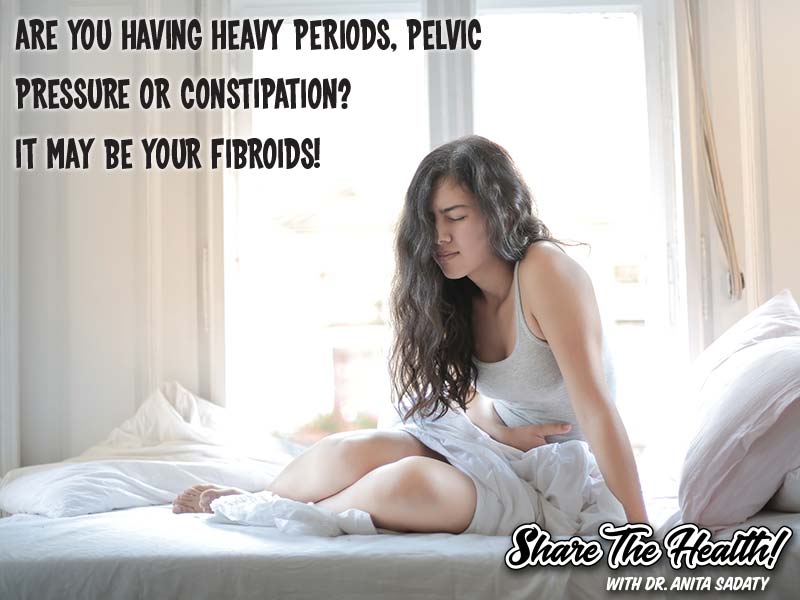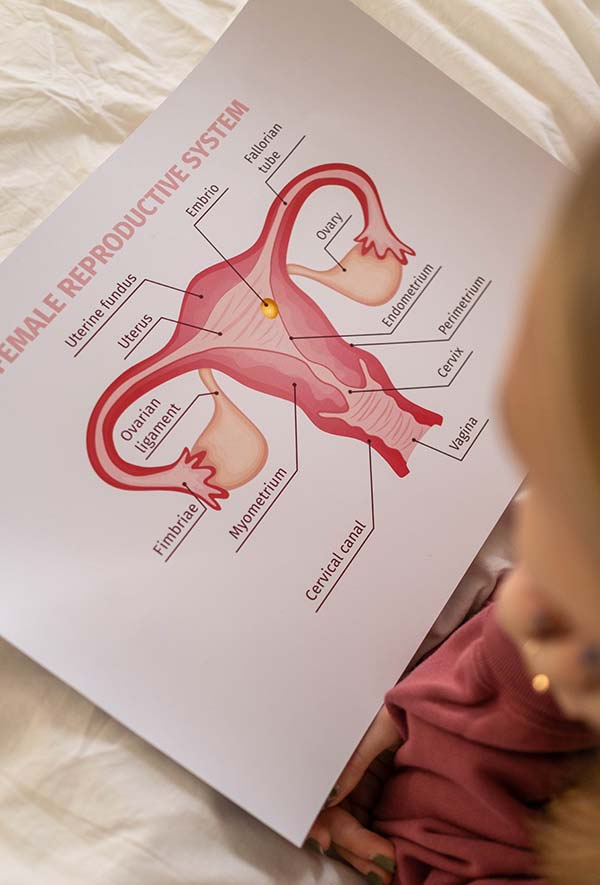
Fibroids Got You Down??
Are you having heavy periods, pelvic pressure, or constipation?
➤ Has anyone ever told you that you have fibroids???
By the age of 50, almost 70-80% of women have fibroids. That number is even higher if we include women who have no symptoms and don’t even know they have them! Fibroids are benign growths of the uterine muscle tissue and the most common reason to have a hysterectomy.
The most common Fibroids symptoms are:
- Heavy periods
- Anemia
- Pelvic pressure or pain
- Painful intercourse
- Difficulty emptying the bladder or frequent urination
- Constipation or bowel dysfunction
- Low back pain
- Fertility problems
- Kidney injury from pressure on the ureters
Standard treatment approaches focus on managing symptoms. These treatments range from surgical removal of fibroids or the entire uterus to less invasive hormonal options that only work temporarily, may be ineffective, and can cause undesirable side effects.
Despite being “benign,” the fact that fibroids are present and continue to grow is very important. Though there may be some genetic influence, the fact that fibroids affect high numbers of women of different cultural backgrounds indicates that there may be other modifiable factors that may be responsible. Understanding these “changeable” factors responsible for fibroid development allows us to focus on alternative ways to slow down or stop growth.
What’s the cause of dwindling levels of progesterone? Usually the answer lies in one of three categories: high levels of estrogen, lack of egg production, or chronic stress (more than one of these can be at play in the same individual).
➤ Fibroid Biology
Most of us know that fibroids are hormone sensitive. They tend to grow more during pregnancy (high progesterone state) and tend to shrink after menopause (low estrogen state). Perimenopausal hormonal imbalances can also cause growth spurts. This shows that BOTH estrogen and progesterone play a part at different times of women’s reproductive cycles in fibroid development. When there is hormonal imbalance, fibroids are triggered to develop and grow.
Six things you can do to help manage fibroids on your own:
1. Eliminate environmental toxins including BPA, parabens, and phthalates. These “endocrine” disrupting chemicals (so called because they mimic hormones like estrogen and progesterone) overload our current environment. They can influence sex hormone levels and play a role in fibroid development.
2. Reduce excess body fat. Women with higher waist-to-hip ratio, higher BMI (body mass index), larger waist circumference, or a greater percentage of body fat are more likely to have fibroids. Because obesity is associated with significant changes in immune, metabolic, and hormonal systems, reducing visceral fat (fat that surrounds your internal organs) improves sugar metabolism, hormone balance, and can help manage fibroids.
3. Manage your stress! Chronic stress can lead to weight gain and weight loss resistance via adrenal hormone imbalance. Effective stress management strategies such as mind-body practices (e.g., Yoga, meditation) and careful exercise programs may improve hormonal imbalances associated with fibroids.
4. Make some simple nutrition changes. Detoxification of hormones in the liver and intestines can reduce levels of certain hormones in the blood and possibly contribute to fibroid growth. Adjusting one’s diet to enhance a healthy clearance of hormones can help.
- Reduce caffeine, alcohol, and consumption of animal products. This can interfere with the liver’s ability to detoxify estrogen. Limit consumption to make your detox process more effective.
- Increase dietary fiber to enhance the elimination of estrogen by-products. Fiber helps to improve bowel movements, your main mechanism of getting rid of toxins.
- Eat phytoestrogens. These are compounds that naturally occur in plants and act as weak estrogens or anti-estrogens. This blocks the ability of other more powerful estrogens from stimulating fibroid growth. Examples of phytoestrogens include:
- Flaxseed lignans
- Resveratrol (sources: peanuts, pistachios, grapes, blueberries, green tea)
- Hops (can be used to make beer, teas, yeast, sauces, dressings)
- Flavonoids (sources: berries, red cabbage, kale, parsley, tea, dark chocolate)
- Isoflavones (lentils, beans, peas, potatoes, vegetables, fruits)
- Eat cruciferous vegetables (cabbage, kale, cauliflower, broccoli, brussel sprouts, etc.) and citrus fruit each day to lower fibroid risk.
5. Check your micronutrient levels. Poor nutritional status can lead to further hormonal imbalances that affect fibroid growth. Identifying and then correcting micronutrient deficiencies and hormone imbalances through diet and careful supplementation can be helpful in managing symptoms.
- Vitamin D (optimal 60-80ng/ml) and Vitamin A are two important micronutrients in fibroid management.
6. Consider adding hormone balancing supplement formulations to your wellness routine.
- Licorice herbs interfere with estrogen-induced fibroid growth and help rebalance hormones
- Supplementing with DIM (Diindolymethane) – also found in cruciferous vegetables – supports the enzyme activity needed to break down estrogen and promotes hormone balance. This can be taken alone or with other liver support supplements (including glutathione).
➤ How can Functional medicine help?
What most people don’t realize is that hormonal imbalance is greater when there are high levels of inflammation in the body and problems in your intestinal tract. So it’s not “just” about your hormones. If you dig deeper, you will see that hormones represent the tip of the iceberg.
Functional medicine’s focus on lifestyle and nutrition allows for alternative treatment options for women suffering from uterine fibroids. This approach considers factors unique to each patient. By focusing attention on balancing hormones, reducing inflammation and rebalancing your gut microbiome via diet, lifestyle, nutrition, and stress management, functional medicine can improve your quality of life, and minimize the need for other chronic medications or surgery.
But don’t wait until it’s too late!! Sometimes the situation with fibroids becomes so severe that lifestyle and nutrition changes alone can’t turn back the hands of time. Don’t wait to address your fibroids. Check in and be proactive with your health!!
➔ We are here to help.
Please Share the Health if you liked what you read!!!
For more information about my wellness programs and my practice, check out my website drsadaty.com. Hey Look! You are already here…
Ready for the legal disclaimer? Information offered here is for educational purposes only and does not constitute medical advice. As with any health recommendations, please contact your doctor to be sure any changes you wish to consider are safe for you!

Thank you! Very informative! I’m sharing it.
Thanks!